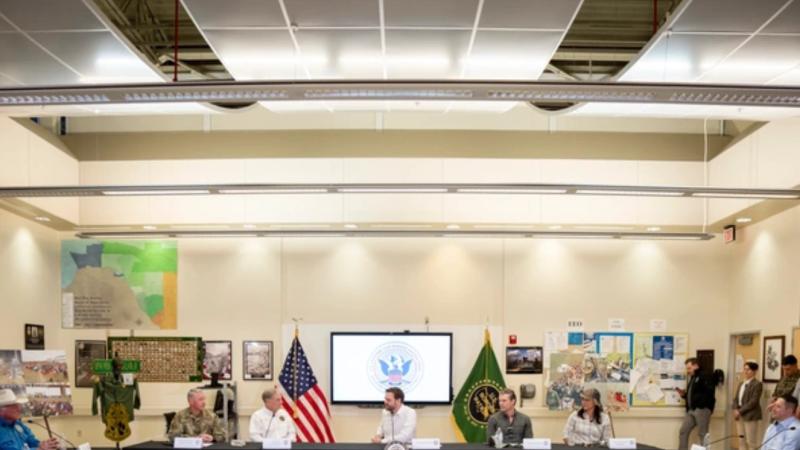PENTAGON CHIEF ACCUSES PETE HEGSETH OF LEAKING WAR PLANS
COMMENT
SHARE

When you’re discussing military plans, it’s typically a good idea to keep your cards close to your chest. However, on March 15th, several top officials in the Trump administration accidentally leaked sensitive information involving attacks against the Houthi in Yemen through a messaging app called Signal. Now, it has been revealed that Defense Secretary Pete Hegseth shared the detailed information in a second group chat that included his wife, brother, and personal lawyer, according to personnel with knowledge of the group chat.
Pentagon Officials' Houthi War Plans Leaked in Text Group
Depending on the nature of its creation, it’s no surprise that being in a group chat with Defense Secretary Pete Hegseth and Vice President JD Vance could lead to discussions about the military.
However, when The Atlantic’s editor-in-chief Jeffrey Goldberg was added to the 18-person chat on Signal, he would become part of a discussion involving attacking targets in Yemen.
An account named Mike Waltz, the same name as the White House’s National Security Adviser, spoke about “weapons packages, targets, and timing” involving the attack right before it occurred.
Despite reports of the exchanges being authentic, President Donald Trump denied knowing about the incident and proceeded to insult the publication.
“I don't know anything about it. I'm not a big fan of The Atlantic. To me, it's a magazine that's going out of business. I think it's not much of a magazine. But I know nothing about it,” said President Trump.
Despite the alleged hiccup, White House press secretary Karoline Leavitt reiterated that President Trump maintains trust in his national security team.
Hegseth denied that war plans were shared but would not confirm whether the information in question was classified.

Pete Hegseth's Second Signal Chat Leak of Classified War Plans
It has now been revealed that Hegseth shared more highly sensitive US military information in a second Signal chat that was shared with his family members, personal lawyer, and more. This is the latest report of information that has come during a time when his management and judgement is under scrutiny.
Allegedly, the information that Hegseth shared on the Signal chat included the flight schedules for the F/A-18 Hornets targeting the Houthis. This is essentially what was shared during the first Signal leak.
Hegseth's wife, Jennifer, is a former Fox News producer. However, she is not a Defense Department employee. Hegseth's brother, Phil, and his lawyer, Tim Parlatore, both have positions in the Pentagon. However, it remains unclear as to why they would need to know about upcoming military strikes.
What We Know About the Second Chat Leak
Details are still emerging about the second information leak. However, we do know that unlike the leak where The Atlantic was accidently included, the new chat was created by Hegseth.
The second chat included his wife, and a dozen other people from his personal and professional inner circle. He used his private phone, rather than his government provided phone, to access the Signal chat.
The second Signal group, "Defense | Team Huddle," was created at roughly the same time as the first one. Hegseth shared information about the Yemen strike here, as well as in the Signal chat group that included The Atlantic.
The "Defense | Team Huddle" chat included a dozen of Hegseth's top aids, and two senior advisors to Hegseth who were accused of leaking unauthorized information and were fired.
Journalist Goldberg's Verification of Pentagon Chat Legitimacy
Chances are, you’ve sent an inadvertent text or two to the wrong person and while this can lead to several embarrassing or negative scenarios for any of us, with national security on the line, stories like this from The Atlantic are a reminder of just how high the stakes are.
“The Trump Administration Accidentally Texted Me Its War Plans” by Goldberg explains how the author received a request to connect on Signal on March 11, 2025, from a user named Mike Waltz.
Two days later, Goldberg was added to a group chat called “Houthi PC small group” that featured 18 people, including various high-ranking officials, including the Vice President, CIA Director John Ratcliffe, Director of National Intelligence Tulsi Gabbard, Secretary of State Marco Rubio, and Treasury Secretary Scott Bessent.
“I had very strong doubts that this text group was real because I could not believe that the national-security leadership of the United States would communicate on Signal about imminent war plans,” wrote Goldberg.
While in the group, the account belonging to Vice President Vance would express concern about attacking the terrorist group because it could help Europe and oil prices might rise.
“I am not sure the (President) is aware how inconsistent this is with his message on Europe right now. There's a further risk that we see a moderate to severe spike in oil prices. I am willing to support the consensus of the team and keep these concerns to myself. But there is a strong argument for delaying this a month, doing the messaging work on why this matters, seeing where the economy is, etc.,” wrote Vance.
In response, Goldberg reported that Hegseth was supportive of Vance’s sentiments, stated that “nobody knows who the Houthis are,” and wanted to focus on connecting the group with Biden’s failure and funding from Iran.
While the journalist wouldn’t publish anything that could “harm American military and intelligence personnel,” he did mention that operational details, including the time of the strikes, 1:45 p.m. ET, were mentioned.
“So I waited in my car in a supermarket parking lot. If this Signal chat was real, I reasoned, Houthi targets would soon be bombed. At about 1:55, I checked X and searched Yemen. Explosions were then being heard across Sanaa, the capital city,” wrote Goldberg.
At this time, Goldberg checked the chat in Signal to find messages congratulating each other on the success of the attack.
“The Signal chat group, I concluded, was almost certainly real. Having come to this realization, one that seemed nearly impossible only hours before, I removed myself from the Signal group, understanding that this would trigger an automatic notification to the group's creator, ‘Michael Waltz,’ that I had left. No one in the chat had seemed to notice that I was there. And I received no subsequent questions about why I left—or, more to the point, who I was," wrote Goldberg.
What Is Signal?
Signal is an app growing in popularity for people who want private, secure messaging without ads or trackers.
It’s free, open-source, and uses end-to-end encryption—meaning only you and the person you're talking to can read your messages, not even Signal itself.
Plus, the platform offers disappearing messages and voice and video calls and works across devices.
Sounds perfect, right? Well, while it's certainly an overall safe platform, there are still security risks that may arise.
One issue users don't love is the requirement to have a phone number to sign up, which led Signal to introduce usernames recently. However, phone numbers are still tied to accounts, maintaining potential security risks.
Overall, Signal is one of the most secure messaging apps out there, but like any technology, it’s not perfect, and user errors can also contribute to lapses in security, as our government is learning with this latest faux pas.

Congress and Public Reaction to Pentagon Text Leaks
When the first leak happened, public reaction and the opinions of those in Congress have ranged from awkward laugh reacts on social media to Democratic lawmakers demanding an investigation take place.
Keep in mind that in addition to this security risk, messages can be set to disappear in Signal, with Waltz allegedly having some set to leave the app after a week and others after a four-week period—which could violate federal law that mandates official records are preserved.
Sen. Jack Reed (D-RI) said that if the allegations are true it, “represents one of the most egregious failures of operational security and common sense I have ever seen.”
In a statement, Reed said, “Military operations need to be handled with utmost discretion, using approved, secure lines of communication, because American lives are on the line. The carelessness shown by President Trump's cabinet is stunning and dangerous. I will be seeking answers from the Administration immediately.”
On the other side of the political aisle, Rep. Mike Johnson (R-LA) defended the incident and believed punishment wasn’t necessary.
"The administration is addressing what happened, apparently, an inadvertent phone number made it onto that thread. They're going to track that down and make sure that doesn't happen again," said Johnson.
Speaking on the conversation, House Speaker Johnson also added that this was just “top-level officials doing their job, doing it well and executing on a plan with precision. That mission was a success. No one was jeopardized because of it. We're grateful for that, but they will certainly, I'm sure, make sure that that doesn't happen again.”
Now, in light of the second leak, government officials on both sides of the aisle are having different reactions. Anna Kelly, a White House spokeswoman has said, "No matter how many times the legacy media tries to resurrect the same nonstory, they can't change the fact that no classified information was shared."
Some congressional Democrats are calling for Hegseth to be removed stating, "Every day he stays in his job is another day troops' lives are endangered by his singular stupidity," said Senator Tammy Duckworth.
Democratic senator Jack Reed added, "If true, this incident is another troubling example of Secretary Hegseth's reckless disregard for the laws and protocols that every other military service member is required to follow."
Suggested reads:
Join the Conversation
BY BUDDY BLOUIN
Buddy Blouin is a Contributing Writer at VeteranLife.com
Buddy Blouin is a Contributing Writer at VeteranLife.com



